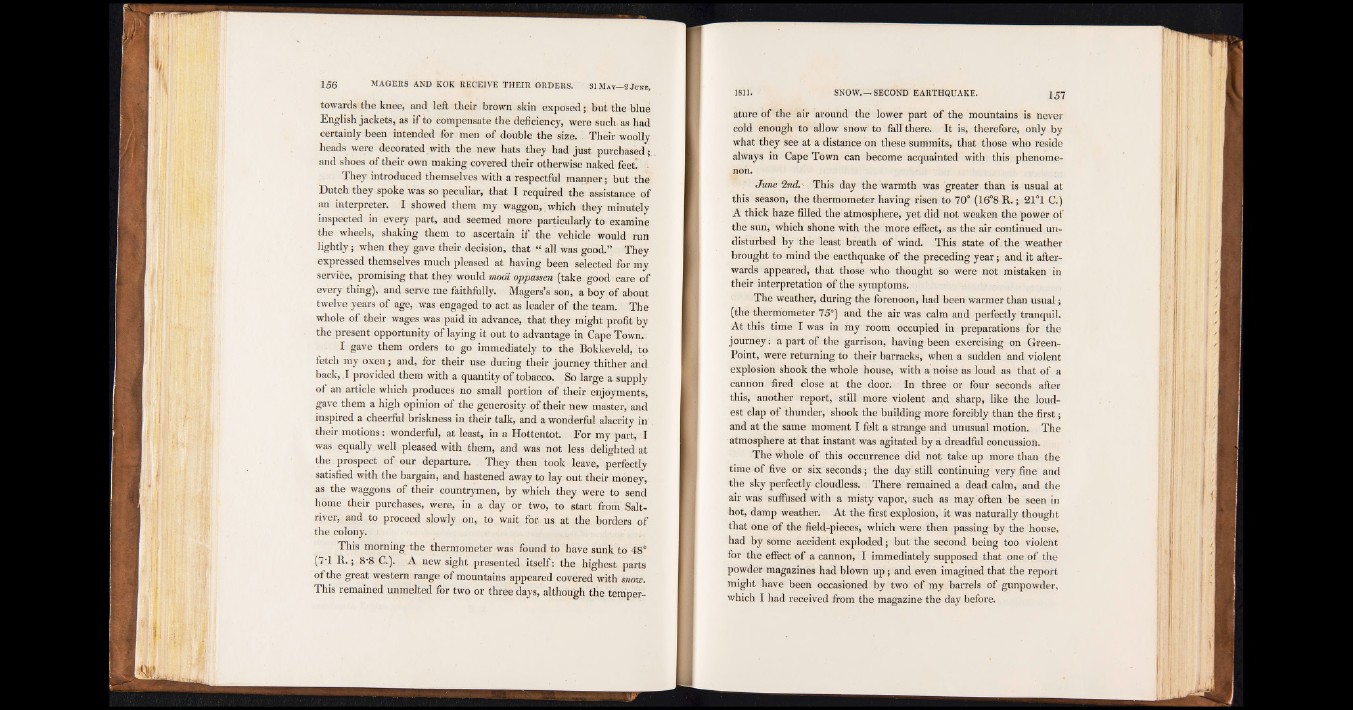
1 5 6 MAGERS AND KOK RECEIVE THEIR ORDERS. SIMay—2 J u s i,
towards the knee, and left their brown skin exposed;, but the blue
English jackets, as if to compensate the deficiency, were such, as had
certainly been intended for men of double the size. Their woolly
heads were decorated with the new hats they had just purchased;.,
and shoes of their own making covered their otherwise naked feet! .
They introduced themselves with a respectful mapper; but the
Dutch they spoke was so peculiar, that I required the assistance of
an interpreter. I showed them my waggon, which they minutely
inspected in every part, and seemed more particularly to examine
the wheels, shaking them to ascertain if the vehicle would run
lightly; when they gave their decision, that “ all was good.” They
expressed themselves much pleased at having been selected for my
service, promising that they would modi oppassen (take good care of
every thing), and serve me faithfully. Magers’s son, a boy of about
twelve years of age, was engaged to act as leader of the team. The
whole of their wages was paid in advance, that they might profit by
the present opportunity of laying it out to advantage in Cape Town.
I gave them orders to go immediately to the Bokkeveld, to
fetch my oxen; and, for their use during their journey thither and
back, I provided them with a quantity of tobacco. So large a supply
of an article which produces no small portion of their enjoyments,
gave them a high opinion of the generosity of their new master, and
inspired a cheerful briskness in their talk, and a wonderful alacrity in
their motions: wonderful, at least, in a Hottentot. For my part, I
was equally well pleased with them, and was not less delighted at
the prospect of our departure. They then took leave, perfectly
satisfied with the bargain, and hastened away to lay out their money,
as the waggons of their countrymen, by which they were to send
home their purchases, were, in a day or two, to start from Salt-
river, and to proceed slowly on, to wait for. us at the borders of
the colony.
This morning the thermometer was found to have sunk to 48°
(7'1 R .; 8-8 C.). A new sight presented itself: the highest parts
of the great western range of mountains appeared covered with mow.
This remained unmelted for two or three days, although the temperature
of the air around the lower part of the mountains is never
cold enough to allow snow to fall there. It is, therefore, only by
what they see at a distance on these summits, that those who reside
always in Cape Town can become acquainted with this phenomenon.
June 2nd. This day the warmth was greater than is usual at
this season, the thermometer having risen to 70° (16°8 R .; 21°1 C.)
A thick haze filled the atmosphere, yet did not weaken the power of
the sun, which shone with the more effect, as the air continued undisturbed
by the least breath of wind. This state of. the weather
brought to mind the earthquake of the preceding year; and it afterwards
appeared, that those who thought so were not mistaken in
their interpretation of the symptoms.
The weather, during the forenoon, had been warmer than usual;
(the thermometer 75°) and the air was calm and perfectly tranquil.
At this time I was in my room occupied in preparations for the
journey: a part of the garrison, having been exercising on Green-
Point, were returning to their barracks, when a sudden and violent
explosion shook the whole house, with a noise as loud as that of a
cannon fired close at the door. In three or four seconds after
this, another report, still more violent and sharp, like the loudest
clap of thunder, shook the building more forcibly than the first;
and at the same moment I felt a strange and unusual motion. The
atmosphere at that instant was agitated by a dreadful concussion.
The whole of this occurrence did not take up more than the
time of five or six seconds; the day still continuing very fine and
the sky perfectly cloudless. There remained a dead calm, and the
air was suffused with a misty vapor,'such as may often be seen in
hot, damp weather. At the first explosion, it was naturally thought
that one of the field-pieces, which were then passing by the house,
had by some accident exploded; but the second being too violent
for the effect of a cannon, I immediately supposed that one of the
powder magazines had blown u p ; and even imagined that the report
might have been occasioned by two of my barrels of gunpowder,
which I had received from the magazine the day before.